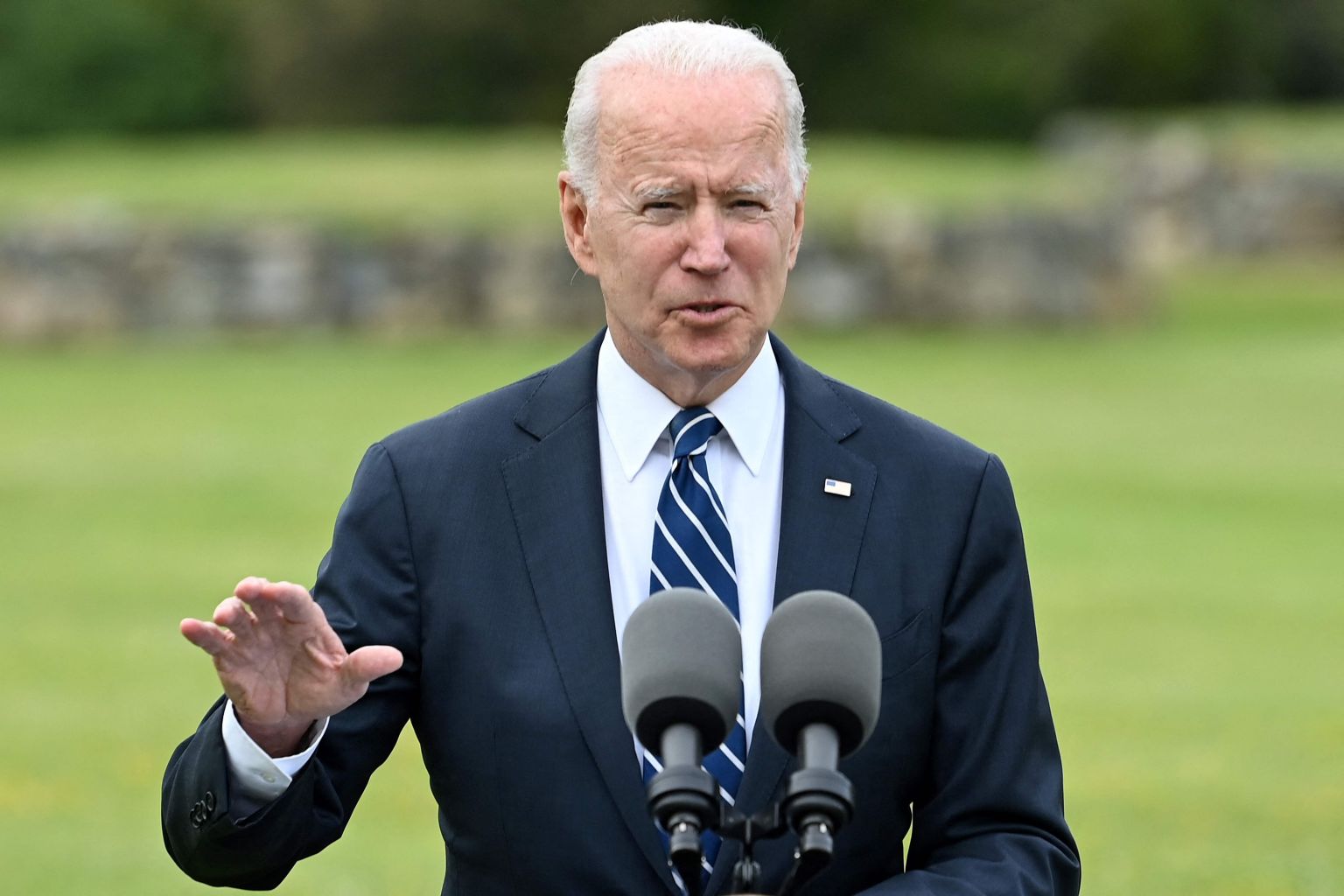Biden says Pfizer Covid-19 shots donated by US will ship globally in August, with 'no strings attached'
Sign up now: Get ST's newsletters delivered to your inbox

US President Joe Biden delivers a speech on the Covid-19 pandemic, in St Ives, England, on June 10, 2021.
PHOTO: AFP
Follow topic:
LONDON (BLOOMBERG) - President Joe Biden announced the US will begin shipping a half-billion donated doses of Pfizer coronavirus vaccines to countries in "dire need" in August, making good on a promise to lead the global campaign against the pandemic.
Biden said on Thursday (June 10) the US purchase and donation of Pfizer's shots would be the largest of any single country so far, and that the vaccines would come "with no strings attached" - veiled criticism of Russia and China, which he has accused of using vaccines as leverage in their foreign policy.
"We know the tragedy. We also know the path to recovery," Biden said at Tregenna Castle in St Ives, Britain, ahead of a Group of Seven (G-7) summit.
"The key to reopening and growing economies is to vaccinate your people."
He noted that the US is donating Pfizer's advanced mRNA-based vaccine, which he said has "proven to be extremely effective against Covid-19 and every known variant of the vaccine thus far."
The donation, he said, would benefit Americans by helping to stamp out the pandemic abroad before more dangerous variants arise.
"Our values call on us to do everything we can to vaccinate the world against Covid-19," he said.
"As long as the virus rages elsewhere, there's a risk of new mutations that could threaten our people."
Biden spoke with Pfizer chairman and chief executive Albert Bourla, who said his company is prepared to create a new shot within 100 days to combat any dangerous mutation that might arise, and is also working on an oral treatment for Covid-19.
"Initial indications are promising, and if things go well, we could apply for approval before the end of this year," Bourla said.
Earlier on Thursday, US officials said the Biden administration will slash in half its US$4 billion (S$5.3 billion) commitment to an international vaccine consortium to help pay for the purchase of the Pfizer shots.
The money previously pledged to Covax, a World Health Organisation-backed group intended to equitably distribute vaccines around the world, instead will go towards an estimated US$3.5 billion bill for the vaccines, which the US is buying at cost - about US$7 a dose, the officials said.
The Pfizer shots will go to 92 lower-income nations selected by Covax. About 200 million of the US-made doses will ship by the end of the year, with the remainder shipping in 2022, the White House said.
The US will consult scientists as it focuses vaccine distribution on low-income countries where inoculations could make the biggest impact in stemming the pandemic, the officials said.
The move may be a setback for Covax, as the US$2 billion the US now plans to use to buy shots directly had been intended to spur other countries to make or increase their own pledges to the consortium. Covax has struggled to obtain enough shots to meet its goal of delivering 1.8 billion doses of vaccine to lower-income countries by early 2022.
One of Covax's partner organisations, the international paediatric vaccination group Gavi, said in a statement on Wednesday that it welcomed the US plan to buy Pfizer shots that would be "delivered through Covax."
A White House statement on Thursday said the administration would be "working through Covax" to distribute the shots. The distinction was not immediately clear.
WHO said in a statement on Thursday that it "welcomes this important contribution to Covax from the USA, which will see more vaccines put to work protecting some of the most vulnerable people in the world from August onward."
"We encourage countries to step forward and share doses immediately, in June and July, to address the urgent supply gap Covax is currently facing," the organisation said.
Biden is pivoting towards a worldwide vaccination strategy as domestic demand for shots wanes. The pace of US shots has fallen by more than two-thirds since April, leaving the administration a glut of doses, some of which are at risk of expiring.
Biden faced international criticism for hoarding early flows of vaccines, allowing his nation to swiftly jump ahead of others in the pace of vaccinations.
The disparity will be plain even around the G-7 table when the summit opens on Friday.
The US and Britain have fully vaccinated over 40 per cent of their populations; Germany, Italy, and France are at about 25 per cent; Canada and Japan are well under 10 per cent.
Biden's initial Covax pledge was US$2 billion, still the most of any nation. He promised another US$2 billion to match donations from other countries. But that money was never allocated to the organisation, and the plan described by the officials on Thursday would instead redirect the funds to buy the Pfizer vaccines.
Biden's administration has previously announced it would donate about 19 million doses of vaccine through Covax, but that the US would retain final say over which countries receive them.

